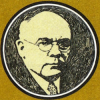Edgar Lee Masters

Edgar Lee Masters
Edgar Lee Masterswas an American attorney, poet, biographer, and dramatist. He is the author of Spoon River Anthology, The New Star Chamber and Other Essays, Songs and Satires, The Great Valley, The Serpent in the Wilderness An Obscure Tale, The Spleen, Mark Twain: A Portrait, Lincoln: The Man, and Illinois Poems. In all, Masters published twelve plays, twenty-one books of poetry, six novels and six biographies, including those of Abraham Lincoln, Mark Twain, Vachel Lindsay, and Walt Whitman...
NationalityAmerican
ProfessionPoet
Date of Birth23 August 1868
CountryUnited States of America
Many books have been written to show that Christianity has emasculated the world, that it shoved aside the enlightenment and wisdom of Hellas for a doctrine of superstition and ignorance.
How shall the soul of a man be larger than the life he has lived?
He stripped off the armor of institutional friendships To dedictate his soul To the terrible deities of Truth and Beauty.
The Typical American? He is sent to school Little or much, where he imbibes the rule Of safety first and comfort; in his youth He joins the church and ends the quest of truth.
The mind sees the world as a thing apart, And the soul makes the world at one with itself. A mirror scratched reflects no image— And this is the silence of wisdom.
The earth keeps some vibration going There in your heart, and that is you. And if the people find you can fiddle, why fiddle you must, for all your life.
Beware of the man who rises to power from one suspender.
There is no marriage in Heaven, but there is love.
Why, a moral truth is a hollow tooth Which must be propped with gold.
In time you shall see Fate approach youIn the shape of your own image in the mirror;Or you shall sit alone by your own hearth,And suddenly the chair by you shall hold a guest,And you shall know that guest,And read the authentic message of his eyes.
The soul of the river had entered my soul, And the gathered power of my soul was moving So swiftly, it seemed to be at rest Under cities of cloud and under Spheres of silver and changing worlds Until I saw a flash of trumpets Above the battlements over Time!
The dust's for crawling, heaven's for flying, Wherefore, O Soul, whose wings are grown, Soar upward to the sun!
This is Darrow, Inadequately scrawled, with his young, old heart, And his drawl, and his infinite paradox And his sadness, and kindness, And his artist sense that drives him to shape his life To something harmonious, even against the schemes of God.
Such phantom blossoms palely shining Over the lifeless boughs of Time.